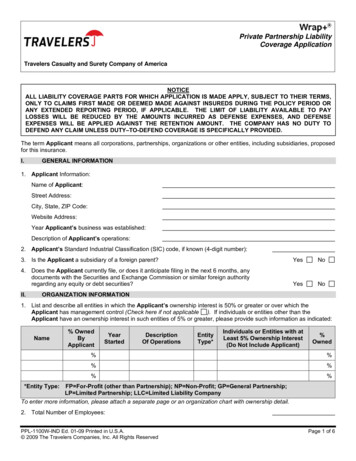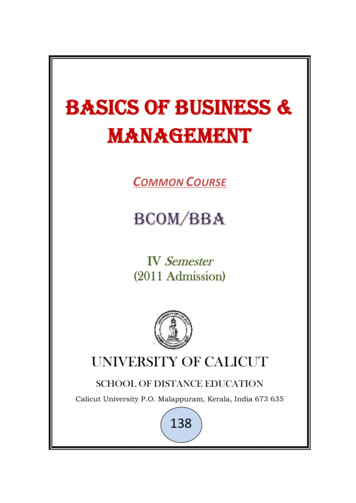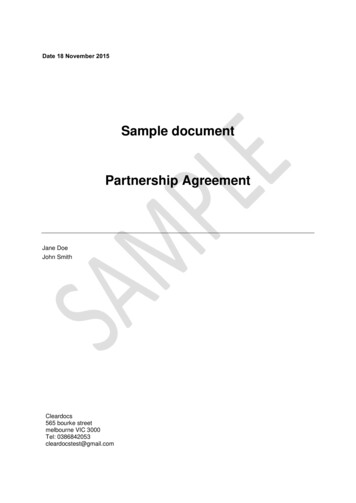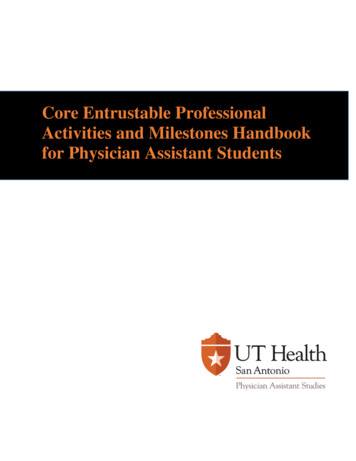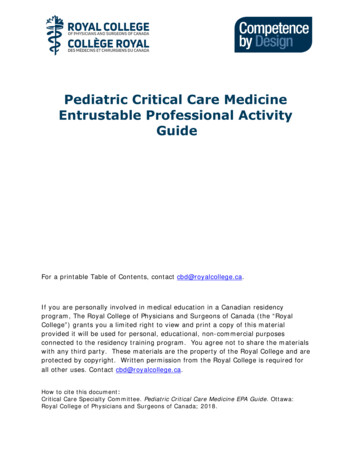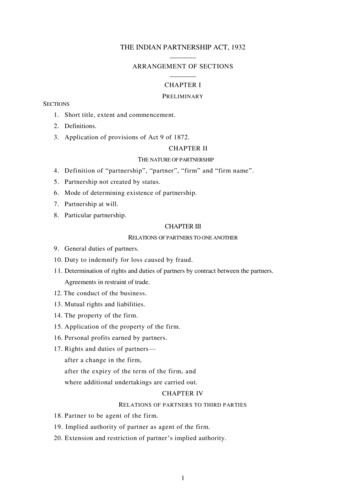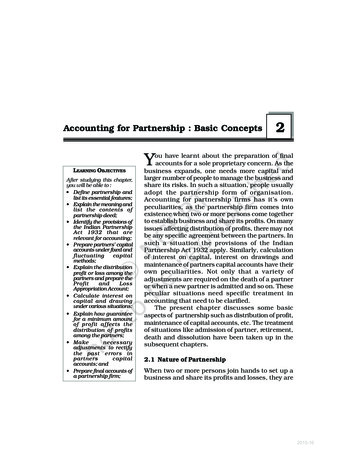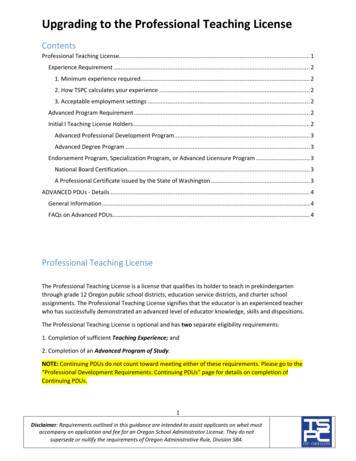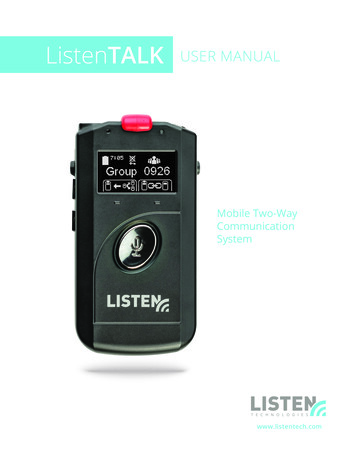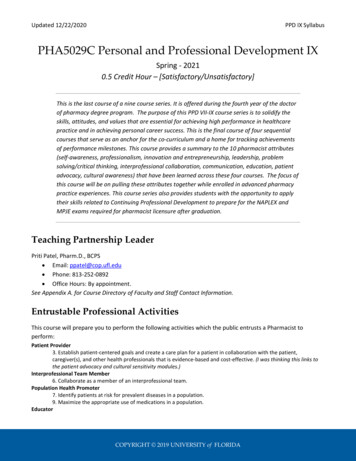
Transcription
Updated 12/22/2020PPD IX SyllabusPHA5029C Personal and Professional Development IXSpring - 20210.5 Credit Hour – [Satisfactory/Unsatisfactory]This is the last course of a nine course series. It is offered during the fourth year of the doctorof pharmacy degree program. The purpose of this PPD VII-IX course series is to solidify theskills, attitudes, and values that are essential for achieving high performance in healthcarepractice and in achieving personal career success. This is the final course of four sequentialcourses that serve as an anchor for the co-curriculum and a home for tracking achievementsof performance milestones. This course provides a summary to the 10 pharmacist attributes(self-awareness, professionalism, innovation and entrepreneurship, leadership, problemsolving/critical thinking, interprofessional collaboration, communication, education, patientadvocacy, cultural awareness) that have been learned across these four courses. The focus ofthis course will be on pulling these attributes together while enrolled in advanced pharmacypractice experiences. This course series also provides students with the opportunity to applytheir skills related to Continuing Professional Development to prepare for the NAPLEX andMPJE exams required for pharmacist licensure after graduation.Teaching Partnership LeaderPriti Patel, Pharm.D., BCPS Email: ppatel@cop.ufl.edu Phone: 813-252-0892 Office Hours: By appointment.See Appendix A. for Course Directory of Faculty and Staff Contact Information.Entrustable Professional ActivitiesThis course will prepare you to perform the following activities which the public entrusts a Pharmacist toperform:Patient Provider3. Establish patient-centered goals and create a care plan for a patient in collaboration with the patient,caregiver(s), and other health professionals that is evidence-based and cost-effective. (I was thinking this links tothe patient advocacy and cultural sensitivity modules.)Interprofessional Team Member6. Collaborate as a member of an interprofessional team.Population Health Promoter7. Identify patients at risk for prevalent diseases in a population.9. Maximize the appropriate use of medications in a population.EducatorCOPYRIGHT 2019 UNIVERSITY of FLORIDA
Updated 12/22/2020PPD IX Syllabus11. Educate patients and professional colleagues regarding the appropriate use of medications.Self-developer15. Create a written plan for continuous professional development.Course-Level ObjectivesUpon completion of this course, the student will be able to:1. Demonstrate the performance expected for each of the following pharmacist attributes:a. Problem-solverb. Educatorc. Patient Advocated. An Includer via cultural sensitivitye. Interprofessional Collaboratorf. Communicatorg. Self-awarenessh. Leadershipi. Innovative mindsetj. Professionalism2. Provide direct patient care in a variety of healthcare settings.3. Contribute effectively as a member of an interprofessional collaborative team.4. Document personal and professional development in an electronic portfolio.5. Demonstrate the continuing professional development process.6. Complete 5 hours of co-curricular activities (live continuing education sessions) that contribute toachieving your professional goals.7. Apply Continuing Professional Development (CPD) skills to guide preparation for the NAPLEX and MPJEBoard exams. Specifically, the student shall document each of the following:a. Reflect on personal knowledge, skills, abilities, beliefs, biases, motivation, and emotions thatcould enhance or limit performance when taking the NAPLEX and MPJE exams upongraduation.b. Design a personal development plan to guide preparation.c. Implement the learning plan by using resources such as those available in Access Pharmacy,ExamMaster, and RxPrep.d. Evaluate achievement of the learning plan including evidence of learning successes,challenges and attainment of mastery.Course Pre-requisites1. Completion of Block 18 of the Doctor of Pharmacy Curriculum including Milestones (end of 3rd year).2. Completion of PHA5028C Personal and Professional Development VIII (second course in year 4)Course Co-requisites1. Concurrently taking at least one Advanced Pharmacy Practice Experience (APPE) during Block 19COPYRIGHT 2019 UNIVERSITY of FLORIDA
Updated 12/22/2020PPD IX SyllabusCourse Outline This course is intended to be self-paced with all course elements to be completed by the conclusion ofthe final course in this series. Below is a description of all the content in the course series. Students arerequired to complete all course elements by the conclusion of this course.Please routinely check the Canvas course site for any messages about changes in the schedule includingdeadlines.DateRecommended Dates forIndependentStudy Unit ivesCovered01/13/2021@11:59pmAssignment: Syllabus : Submit revised LicensureReadiness Learning Plan (Canvas)Buring702/15/2021@11:59pmAssignment: MPJE assignment #1Buring702/15/2021@11:59pmAssignment:Complete 4 hours of live (face-to-face)Continuing Education for Pharmacists(Appendix C) (Salesforce)Patel603/01/2021@11:59pmAssignment: MPJE assignment #2Buring7TBA04/30/2021@11:59pm4.0hr –cocurricularAttend: Live MPJE review5.5hrBuring7Assignment: Complete Pre-NAPLEX &submit report to Canvas2.0hrBuring7Various2, 3Milestone Assessments Professionalism (longitudinal) OSCECOPYRIGHT 2019 UNIVERSITY of FLORIDA
Updated 12/22/2020PPD IX SyllabusRequired Textbooks/Readings Shapiro K, Bombatch C, Garrett SD, Veverka A, & RxPrep (Firm). (2021). RxPrep course book: 2021Naplex course book.Dr. C's Ultimate Florida and Federal MPJE Review 2021, ISBN #978-0-578-79449-5***NEW/UPDATED from NABP: NAPLEX Application Bulletin (Student Guide for 2020) – Accessedat APLEX-MPJE-Bulletin July 2020-1.pdfMPJE RESOURCES Florida Statuteso Available online: http://www.leg.state.fl.us/statutes/ Florida Administrative Codeo Available online: https://www.flrules.org/ Live MPJE Law Review – provided free by the college; FL MPJE Law Review book will be provided onsite Survey of Pharmacy Law – Resource from NABP on Canvas. Includes information for all states andprovides comparison tables.NAPLEX RESOURCES Pre‐NAPLEX (Accessible via voucher code) ‐ The Pre‐NAPLEX consists of 100 questions andyou are allowed 140 minutes to complete. The Pre‐NAPLEX content corresponds to the NAPLEX CompetencyStatements, which can be found in the NAPLEX/MPJE Application Bulletin. The Pre‐NAPLEX is scored in a similar fashion as the NAPLEX. Although NABP does not claim that astrong performance on the pre‐NAPLEX indicates passing the NAPLEX, studies have shown thatperformance on the Pre‐NAPLEX is correlated with NAPLEX scores. When you complete the exam, NABP will give you an estimated scaled score based on your answers tothe Pre‐NAPLEX questions. Evaluating where you are at this point in time will help you identify whereyou need to focus your additional study time. Download your score report as you will need to uploadthis to Canvas to document completion. You will take the pre‐NAPLEX online at the location of your choosing. It is recommended that you createa test‐taking environment similar to what you will experience with the NAPLEX. This means a private,quiet location with no study materials, beverages, food, cell phones, etc. See p.20 of the NAPLEXbulletin below for what is not allowed in the testing center. Using reference materials while taking thepre‐NAPLEX will skew your performance and will not give you an accurate assessment of yourknowledge competency at this point in time. RxPrep 2021 Course Book – NAPLEX prep text that is easy to follow, evidence‐based, is positivelyreviewed, and is updated yearly. The following resources are available at the HSC Library website:o AccessPharmacy: URL for Login: http://accesspharmacy.mhmedical.com/ How to create a login(if you don’t have one): http://guides.uflib.ufl.edu/pharmd Resources available:COPYRIGHT 2019 UNIVERSITY of FLORIDA
Updated 12/22/2020 PPD IX SyllabusFlashcards (online flashcards to review Pharmacotherapy, Pharmacology, Top 100 nonprescription drugs and pharmacy calculation review)Review questions (Generate MCQs from multiple references). The following referencesare suggested: 1. Drug Information: A guide for pharmacists ‐6th edition 2. Lange Q&A Pharmacy, 10th edition 3. McGraw‐Hills NAPLEX Review Guide, 3rd edition 4. Medication Therapy Management: A comprehensive approach, 2nd edition 5. Pharmacotherapy Principles and Practice, 4th edition 6. Pharmacotherapy: A Pathophysiologic Approach, 10th edition 7. Pharmacy and Federal Drug Law Review 8. Quick Review: Pharmacy, 13th Edition 9. Workbook and Casebook for Goodman and Gillman’s – The PharmacologicalBasis of TherapeuticsTop 300 Prescription Drug Challenge This allows you to test yourself on the top 300 drugsTop 300 Drugs Flashcards – Access Pharmacy SHOWDOWN (You and a colleague take turns answeringknowledge, quiz‐bowl style questions. You can play live or opt in to get emailnotifications when its your turn. You can also improve your own skills bychallenging the computer.)NAPLEX Central 1. New ‐2018 NAPLEX Online Question Bank 2. Lange Q&A Pharmacy, 10th edition 3. McGraw‐Hill’s NAPLEX Review Guide, 3rd edition 4. Quick Review: Pharmacy, 13e 5. The following are relevant to the MPJE:o a. Weissman: Pharmacy Practice and tort Lawo b. Feinberg: Pharmacy Law – Examination and Board Reviewo c. Kosegarten: Pharmacy and Federal Drug Law ReviewSuggested Textbooks/Readings RxPrep MPJE Law Review ( 185 X 6 months) – recommended not requiredPharmacy Exam MPJE ( 35‐ 65) pharmacyexam.com – recommended not requiredRxLaw.org – recommended not requiredrxpharmacist.com ("rxu" for 10% off) – recommended but not requiredCOPYRIGHT 2019 UNIVERSITY of FLORIDA
Updated 12/22/2020PPD IX SyllabusOther Required Learning ResourcesNoneMaterials & Supplies FeesStudents will be required to cover any costs associated with participation in live continuing education activitiesincluding, but not limited to registration and travel expenses. 49.50 for Pre‐NAPLEX voucher. Discounted from 65 due to college ordering and 100 person discount.Student Evaluation & GradingThe Personal and Professional Development IV course series are pass/fail courses. Passing requires successfulcompletion of all milestones and course requirements listed. To pass the final course in the series, you mustcomplete all course series elements listed below. At a minimum this should include:- Submit Learning Plan Part 2 for NAPLEX/MPJE- Complete and submit MPJE assignments- Attend live MPJE review- Complete Pre-NAPLEX exam and submit score report- Submitting participation of all co-curricular (live continuing education) activities- Completing of Year 4 milestone assessmentsAssessment ItemDeadlineCriteriaCo-Curricular ActivityParticipation logFebruary 15, 2021 Complete 4 hours of live continuingeducation for pharmacists. The events mustbe offered face-to-face (live webinars will notbe permitted), See Appendix C. Submit activity participation log to Canvas.Submit NAPLEX/MPJELearning Plan Part 2January 18, 2021Prepare a written Learning Plan that adds thePlanning,Learning, and Evaluation sections tothe previously submitted Learning Plan.Upload your revised NAPLEX/MPJE LearningPlan to Canvas.Must earn “acceptable” on each of the abovesections (see Appendix C).Complete MPJEassignments 1 and 2February 15, 2021March 01, 2021Complete and submit to CanvasCOPYRIGHT 2019 UNIVERSITY of FLORIDA
Updated 12/22/2020PPD IX SyllabusAssessment ItemDeadlineCriteriaAttend live MPJEreviewTBAAttend live MPJE review on campusComplete Pre-NAPLEXexam and upload PreNAPLEX score reportApril 30, 2021Complete pre-NAPLEX exam.Upload your Pre-NAPLEX score report toCanvas.Students scoring 65% will receive advising.Year 4 MilestonesEnd of semester. OSCE datesTBA.Satisfactory completion of the followingmilestones that denote readiness forgraduation: OSCEProfessionalismCourse Specific PoliciesProfessionalism Assessments:Professionalism is an educational outcome of the Pharm.D. program and therefore, is continually assessed.Professional behaviors and attitudes are evaluated at each annual milestone to determine progression andeventual readiness for graduation.Professionalism will be tracked and assessed utilized the most current version of the ProfessionalismAdvisement Plan. The current version can be found here: s/course-policies/#professionalismAll quizzes administered in the course are pass/fail. To pass the quiz you must earn 80% on the quiz. You will beprovided with 2 attempts to complete the quiz to earn the passing score. If the passing score is not earned onthe second attempt, additional assignments will be required for you to complete to demonstrate competence inthe content area in order to earn a passing grade for the course.Educational Technology UseThe following technology below will be used during the course and the student must have the appropriatetechnology and software.1. Canvas Learning Management System2. Salesforce For technical support, navigate to Educational Technology and IT Support Contact Information at this dents/technical-help/COPYRIGHT 2019 UNIVERSITY of FLORIDA
Updated 12/22/2020PPD IX SyllabusPharm.D. Course PoliciesThe Policies in the following link apply to this course. Review the Pharm.D. Course Policies carefully, at this dents/course-policies/COPYRIGHT 2019 UNIVERSITY of FLORIDA
Updated 12/22/2020PPD IX SyllabusAppendix A. Course DirectoryTeaching Partnership Leader/Course Director:Priti Patel, Pharm.D., BCPS Email: ppatel@cop.ufl.edu Phone: 813-252-0892 Office Hours: By appointment.Questions to Ask: Concerns about performanceGuidance when there are performance problems (failing grades)General questions about contentCo-Curriculum Program Specialist:Sarah MazorraEmail: smazo@cop.ufl.eduOffice: HPNP G-235/GNVPhone: 352-273-8203Questions to Ask: Anything related to co-curricular activitiesAnything related to the Career Coach program (issues contacting coach, Salesforce Portfolio, CPD,deadlines, etc.)Issues related to course policies (make-up assignments)Questions about dates, deadlinesGeneral questions about content and assignment directionsQuestions about grade entries gradebook (missing grades, incorrect grades)COPYRIGHT 2019 UNIVERSITY of FLORIDA
1012/22/2020 11:58 AMOther Teaching Partnership Faculty Members:Shauna Buring, PharmDEmail: sburing@cop.ufl.eduOffice: HPNP 4319Phone: 352-294-8426COPYRIGHT 2019 UNIVERSITY of FLORIDA
1112/22/2020 11:58 AMAppendix B. Live Continuing EducationCo-curricular Activity DescriptionCo-curricular activities in the final year of the curriculum should continue to align with the professional goals youhave created in the continuing professional development process. However, this year will focus on transitioningfrom being a student to a practicing pharmacist. Therefore, the co-curricular activities you will complete alignwith the continuing education requirements for pharmacists, and you must attend at least 4 hours of livecontinuing education sessions.The live continuing education sessions MUST be completed:- In person (not online)- Outside of normal activities for the Advanced Pharmacy Practice Experiences (e.g. if you are required toattend a live presentation that is also approved for CE as part of your APPE, this time will not counttowards your 4 hour requirement.)- Between (June 22, 2020-February 15, 2021)Opportunities to attend live continuing education:- Local/regional professional pharmacy organization meetings- Florida Board of Pharmacy meetings- State professional pharmacy organization annual or interim meetings (e.g. FSHP, FPA)- National professional pharmacy organization annual or interim meetings (e.g. APhA, ASHP, ACCP, AACP)- Interdisciplinary health profession organizations (these could be local/regional/state/national)Attendance must be certified by a pharmacist with a leadership position for the organization, or the persongiving the presentation. All required information on the Continuing Education Participation Log (found onCanvas) must be submitted by the due date.Live guest speakers that have been organized by local professional student organizations do not meet therequirements for this assignment.Students are responsible for costs associated with participation in live continuing education activities including,but not limited to registration and travel expenses.COPYRIGHT 2019 UNIVERSITY of FLORIDA
1212/22/2020 11:58 AMAppendix C. Licensure Readiness Learning Plan RubricAcceptableReflection: This includesexamining and consideringpersonal knowledge skills, abilities,beliefs, biases, motivation andemotions that could enhance orlimit performance, personal andprofessional growth. Reflectioninvolves self‐assessment or self‐appraisal on personal andorganizational needs andgoals. The act of self‐assessmentinvolves observing, analyzing, andreflecting on performance, judgingthe degree to which it meetsstandards/criteria, anddetermining strategies forimprovement.Planning: A personal developmentplan is designed to include bothformal and informal learningactivities to achieve intendedoutcomes. Planning involves theprocess of defining learningobjectives, learning activities,required resources and measuresof success.Learning: The plan can be put intoaction to meet identified needsand goals utilizing an appropriaterange of learning activities andmethods.Evaluation: The plan’simplementation and achievementof objectives can be assessed byconsidering outcomes andimpact. Evaluation involvesregular review of progress,evaluation of learning successes,challenges and evidence ofattainment or mastery.PART 1The reflection references results ofassessments taken to date (eg,ExamMaster, AccessPharmacyquizzes, etc.) It also identifiesspecific NAPLEX and MPJEcompetency areas that arestrengths and those that are areasfor improvement. The self‐analysis effectively identifiesperformance gaps.PART 2The plan identifies SMARTobjectives created to help achievethose goals. The learning activitiescited are clearly consistent withidentified gaps. Realistic timeframes have been identified.The personal learning plan outlinesthe specific learning activities (eg,chapters, assessments/exams)that will be accomplished eachweek. (e.g., template is filled inwith a plan each week)There is a clear plan for evaluatingachievement of the identifiedSMART objectives.UnacceptableThe reflection may reference priorassessments and/or NAPLEX/MPJEcompetency areas that arestrengths and those that are areasfor improvement. However, oneor more of these elements are notwell defined. Analysis is alsolacking or ineffective.The SMART objectives do not alignand/or are not measurable. Thelearning activities cited are notalways consistent with theidentified gaps and/or the timeframe may be unrealistic.The personal learning plan doesnot outline specific learningactivities and/or does not providesufficient detail to guide learningon a weekly basis.There is not a clear plan forevaluating achievement of theidentified SMART objectives.COPYRIGHT 2019 UNIVERSITY of FLORIDA
1312/22/2020 11:58 AMAppendix D. NAPLEX Competency Statements (**NEW for 2021)The North American Pharmacist Licensure Examination (NAPLEX ) Competency Statements provide a blueprintof the topics covered on the examination. They offer important information about the knowledge, judgment,and skills you are expected to demonstrate as an entry-level pharmacist. A strong understanding of theCompetency Statements will aid in your preparation to take the examination.As of January 1, 2021Area 1 – Obtain, Interpret, or Assess Data, Medical, or Patient Information(Approximately 18% of Test) 1.1 – From instruments, screening tools, laboratory, genomic or genetic information, or diagnosticfindings1.2 – From patients: treatment adherence, or medication-taking behavior; chief complaint, medicationhistory, medical history, family history, social history, lifestyle habits, socioeconomic background1.3 – From practitioners: treatment adherence, or medication-taking behavior; chief complaint,medication history, medical history, family history, social history, lifestyle habits, socioeconomicbackground1.4 – From medical records: treatment adherence, or medication-taking behavior; chief complaint,medication history, medical history, family history, social history, lifestyle habits, socioeconomicbackground1.5 – Signs or symptoms of medical conditions, healthy physiology, etiology of diseases, orpathophysiology1.6 – Risk factors or maintenance of health and wellness1.7 – Evidence-based literature or studies using primary, secondary, and tertiary referencesArea 2 – Identify Drug Characteristics (Approximately 14% of Test) 2.1 – Pharmacology, mechanism of action, or therapeutic class2.2 – Commercial availability; prescription or non-prescription status; brand, generic, or biosimilarnames; physical descriptions; or how supplied2.3 – Boxed warnings or REMS2.4 – Pregnancy or lactationArea 3 – Develop or Manage Treatment Plans (Approximately 35% of Test) 3.1 – Triage or medical referral3.2 – Therapeutic goals or outcomes and clinical endpoints3.3 – Medication reconciliation; indication or therapeutic uses; lack of indication; inappropriateindication; duplication of therapy; omissions3.4 – Drug dosing or dosing adjustments; duration of therapy3.5 – Drug route of administration, dosage forms, or delivery systems3.6 – Drug contraindications, allergies, or precautionsCOPYRIGHT 2019 UNIVERSITY of FLORIDA
1412/22/2020 11:58 AM 3.7 – Adverse drug effects, toxicology, or overdose3.8 – Drug interactions3.9 – Therapeutic monitoring parameters, monitoring techniques, monitoring tools, or monitoringfrequency3.10 – Drug pharmacokinetics or pharmacodynamics3.11 – Evidence-based practice3.12 – Non-drug therapy: lifestyle, self-care, first-aid, complementary and alternative medicine, ormedical equipmentArea 4 – Perform Calculations (Approximately 14% of Test) 4.1 – Patient parameters or laboratory measures4.2 – Quantities of drugs to be dispensed or administered4.3 – Rates of administration4.4 – Dose conversions4.5 – Drug concentrations, ratio strengths, osmolarity, osmolality, or extent of ionization4.6 – Quantities of drugs or ingredients to be compounded4.7 – Nutritional needs and the content of nutrient sources4.8 – Biostatistics, epidemiological, or pharmacoeconomic measures4.9 – Pharmacokinetic parametersArea 5 – Compound, Dispense, or Administer Drugs, or Manage Delivery Systems(Approximately 11% of Test) 5.1 – Physicochemical properties of drug products affecting compatibility, stability, delivery, absorption,onset, duration, distribution, metabolism, or elimination5.2 – Techniques, procedures, or equipment for hazardous or non-hazardous sterile products5.3 – Techniques, procedures, or equipment for hazardous or non-hazardous non-sterile products5.4 – Equipment or delivery systems5.5 – Instructions or techniques for drug administration5.6 – Packaging, storage, handling, or disposalArea 6 – Develop or Manage Practice or Medication-Use Systems to Ensure Safety andQuality (Approximately 7% of Test) 6.1 – Interdisciplinary practice, collaborative practice, or expanded practice responsibilities6.2 – Continuity of care or transitions of care6.3 – Disease prevention or screening programs; or stewardship6.4 – Vulnerable populations, special populations, or risk prevention programs6.5 – Pharmacy informaticsCOPYRIGHT 2019 UNIVERSITY of FLORIDA
NAPLEX RESOURCES Pre -NAPLEX (Accessible via voucher code) - The Pre-NAPLEX consists of 100 questions and you are allowed 140 minutes to complete. The Pre-NAPLEX content corresponds to the NAPLEX Competency Statements, which can be found in the NAPLEX/MPJE Application Bulletin. The Pre-NAPLEX is scored in a similar fashion as the NAPLEX.
